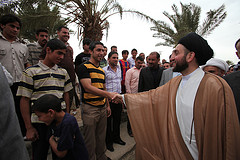Sayyid Ammar al-Hakim: Solving the problems requires patriotic Iraqi solutions

 The Head of the Islamic Supreme Council of Iraq (ISCI), Sayyid Ammar al-Hakim, has stressed that there is no option for solving the problems except via truthful dialogue and the addressing of the legitimate demands via patriotic Iraqi solutions distantly fro the foreign interferences. His Eminence stressed the necessity of containing all spectrums of the Iraqi society based on the principle of fair citizenship and the excluding of the extremist forces that block the paths of brotherly understanding among the Iraqis.
The Head of the Islamic Supreme Council of Iraq (ISCI), Sayyid Ammar al-Hakim, has stressed that there is no option for solving the problems except via truthful dialogue and the addressing of the legitimate demands via patriotic Iraqi solutions distantly fro the foreign interferences. His Eminence stressed the necessity of containing all spectrums of the Iraqi society based on the principle of fair citizenship and the excluding of the extremist forces that block the paths of brotherly understanding among the Iraqis.
In the speech which he delivered at the 26th international Islamic unity conference held in Tehran on Sunday, January 27, 2013, Sayyid Ammar al-Hakim said, “The reform mission has no worldly ambitions, causing the reformer to think of the project more than he thinks of his own position in this project.” He added saying, “We have to follow the example of the holiest Prophet (P) in our reform project within these measurements and frameworks. One of the most important challenges that stand in our face is represented by the attempts of casting doubts and of divisions based on sectarian schisms which tear up the nation. Followers of a sect are a blessing, but sectarianism is a curse because societies are comprised of groups of people who interact among themselves. Getting together and interacting are the two basic corners of societies. There is no interacting without a variation in competencies and preparedness.”
His Eminence added saying, “Essentially, variety does not lead to difference and to division as much as it expresses a real social need that links some people to others.” He explained saying, “Sects mean plurality of viewpoints which the source of richness because it creates diversity. It contains experiences, designs, discoveries: ‘Had your Lord willed, He would have made you a single nation, and they remain differing (among themselves).’ The serious danger is when the plurality of sects is utilized for fanaticism, for stirring rivalries under the sectarian sanctity.”
His Eminence contended that, “If the plurality of sects forms a barrier or a weakness or a division of one society into many, this is dangerous to the nation. But if the plurality of sects leads to an exchange of experiences, branches of knowledge and civilizations, it is strength. The daner itself lies in the plurality of parties when it turns into fanaticism, opportunism and the advancing of the partisan and group interests over the public interests. The same danger lies in the social classes when it turns into a reason for bypassing others and looking down at them. The same problem lies in nationalism: some people are placed above others. All these matters endanger good citizenship when they are used in a negative and erroneous way.”
His Eminence stressed that, “People who are the most fanatical towards a sect may be the furthermost from following a religion. This is so because sectarianism was not presented as a religion that leads the government; rather, it is to divide the public. Therefore, it is a basic topic, not a religious one. Moreover, secularism itself does not form a government system, and it may be the characteristic of a democratic system because it may be a feature of a dictatorial system rather than treating the problem of strong forces overwhelming weak ones. It causes the society to lose a great immunity represented in its spiritual and moral stock. It may also form a social framework that risks man’s human attribute, requiring us to bear a joint responsibility in standing in the face of the sectarian policies, in strengthening the nation’s unity and cohesion. The axis of this unity is our Holy Prophet (P) and his Ahl al-Bayt (ع) as well as the nation’s supreme interests.”
Sayyid Ammar al-Hakim drew attention to the fact that, “The Islamic awakenings which we nowadays witness in our Arab world require more unity, more standing shoulder-to-shoulder and more solidarity in order to safeguard and deepen them. From both parties, the Islamic movement is facing a serious challenge to prove its ability to administer the societies, setting out of Islam’s vision and adherence to the tolerant basics, constants and principles.”
About the Syria-related events, Sayyid Ammar al-Hakim regarded the passage of two years of the bloody events in Syria as ensuring that it proves “the failure of the iron and fire policy in settling the paths,” stressing the return to the truthful dialogue, to construction, in order to restore stability to it, and to addressing the legitimate demands of the brotherly people of Syria.
His Eminence also called on the leaders of Bahrain “to stick to its people’s demands, to listen to them, and to address their demands, so national harmony may return to this brotherly country,” stressing the peaceful stance of the Bahraini people which expresses a high level of discipline in maintaining a sound conduct and performance, regarding this as a precious opportunity which must be well utilized.
At the conclusion of his speech, His Eminence stressed that “Palestine shall remain a basic axis for the nation’s unity. We have to stress backing it, to assist and to support it,” drawing attention to the important victories that have been achieved by the Palestine nation in its war with Israel as being nothing but evidence for the importance of coordination and solidarity in supporting this just cause. “This is an opportunity for us to call on all struggling Palestinian groups to unite their stance and conduct as they face the usurping Zionist entity.”







